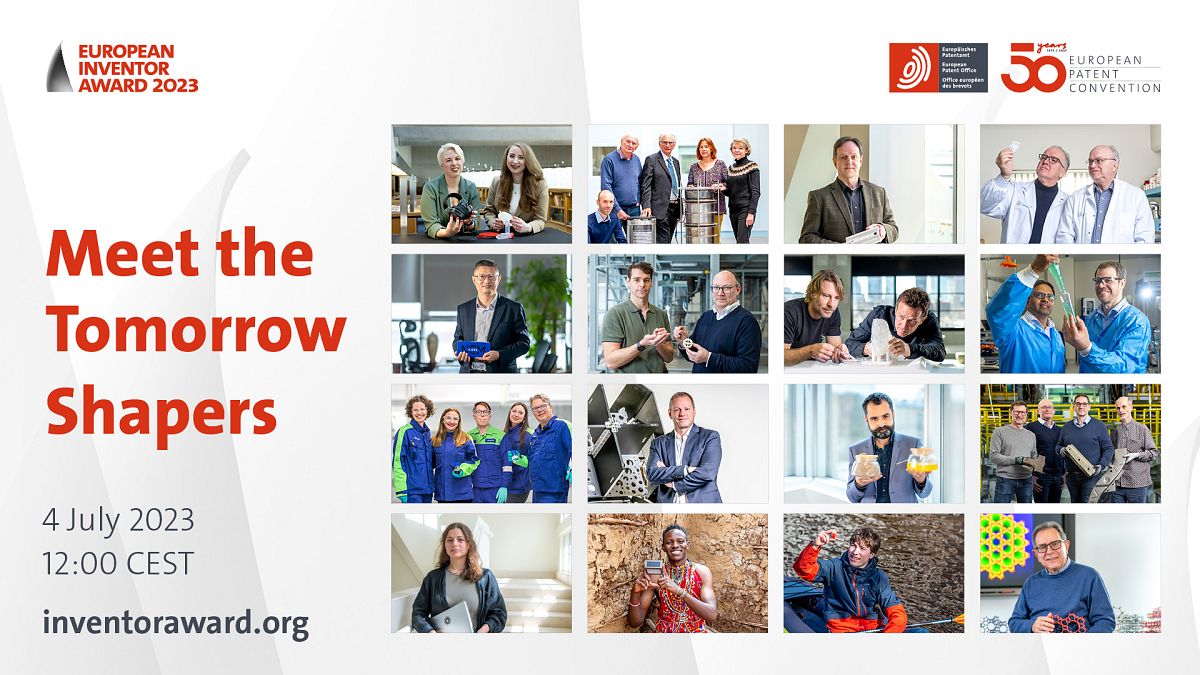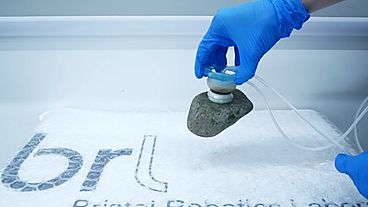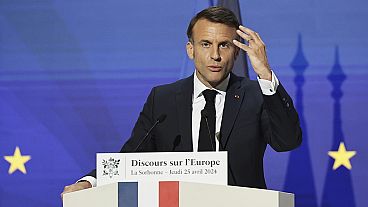Projects combining sustainability and tech innovation won big at this year's award. The annual prize celebrated European innovators across diverse fields from aerospace to livestock.
This year's annual European Inventor Award celebrated experts who have put their talents and skills to work to create sustainable technological innovations that do not only help humanity, but the planet too. The winners were announced today during a hybrid ceremony in Valencia, Spain that was live-streamed by Euronews.
Run by the European Patent Office (EPO), the European governing body that grants patents to new inventions, the European Inventor Award is a coveted symbol of innovation across technical fields in Europe and beyond.
On the same day, the EPO formally awarded this year’s Lifetime Achievement Award to Avelino Corma Canós, a world-famous Spanish chemist who has distinguished himself in the field of heterogeneous catalysis.
During the full ceremony, awards were handed out across four categories, as well as the Young Inventors Prize and the Popular Prize.
This year’s theme was Tomorrow Shapers. The EPO wanted the awards to highlight the best inventors whose perseverance, ingenuity and creativity are paving the way to a brighter future.
The four main categories for the awards were: Industry, Research, Non-EPO Countries, and SMEs. Of those four categories, there was also a Popular Prize which is voted for by the public for their favourite inventor and the Young Inventors Prize, which celebrates inventors under 30 working towards sustainability solutions.
The big themes at this year's award were sustainability, green energy, climate innovation, and medical technology.
“The innovation shown by this year’s finalists, in the face of the modern world’s many shared challenges, such as sustainability, the energy transition and social inequality, is a source of inspiration,” said EPO President António Campinos. “These awards celebrate their work and the progress it represents.”
Here are this year's winners:
Industry
Finnish team Pia Bergström, Annika Malm, Jukka Myllyoja, Jukka-Pekka Pasanen and Blanka Toukoniitty won the‘Industry’category for developing a unique process that converts plant and animal waste and residues into renewable products, such as fuel.
The use of fuels like the one created by the Finnish team can reduce greenhouse gas (GHG) emissions by as much as 75-95% over the life cycle of the fuel compared to fossil diesel. According to the International Energy Agency (IEA), the global transport sector emits approximately 7.3 billion tonnes of CO2 a year, around 20% of global CO2 emissions. They estimate that medium-to-heavy lorries and aviation alone are responsible for 30% of that total.
Research
French inventors Patricia de Rango, Daniel Fruchart, Albin Chaise, Michel Jehan and Nataliya Skryabina were the winners in the ‘Research’ category. The three developed a technology able to easily compress, store and transport hydrogen in the solid form of a disc.
The technology is able to make storage and transportation easier -- a crucial factor in combatting climate change.
“The quest for green, renewable and abundant energy is one of humanity's primary concerns,” the French team said.“Hydrogen has great potential but its storage and distribution raise questions of logistics and safety. This award sets us on a path to a decarbonised future, applying our hydrogen storage solution on an industrial scale.”
Non-EPO countries
Chinese scientist Kai Wu and his team, who have pioneered a series of features to improve the safety and performance of li-ion batteries that can help the shift to cleaner motoring, won in the ‘Non-EPO Countries’ category.
Wu and his team's invention is able to mitigate battery safety risks, and could help ensure the safety of vehicles equipped with lithium-ion (Li-ion) batteries containing a flammable electrolyte.
"It is a great honour to win such a prestigious award, which will shine a path forward to further innovation efforts for me and CATL. What is more, electric vehicles powered by our advanced and safe batteries are enabling more people to embrace a sustainable lifestyle, contributing to the global energy transition. I hope that young inventors around the world adhere to the philosophy of learning more, doing more and asking more, to develop more innovations for the benefit of mankind,” said Wu.
SMEs
Irish inventors Rhona Togher and Eimear O’Carroll won ‘SMEs’ category for their composite technology that reduces noise to address chronic sleep deprivation. The duo's invention can be integrated into household appliances, as well as in the automotive, construction, and aerospace industries.
According to the European Environment Agency (EEA) approximately 20% of the EU population lives in areas with unacceptable noise and vibration levels. Due to noise pollution, the EEA estimates that 22 million people across Europe currently suffer from chronic high annoyance, whilst 6.5 million suffer chronic high sleep disturbance.
Young Inventors Prize
The Young Inventors Prize went to Maasai Kenyan conservationist Richard Turere, who has developed a light system to deter lions from attacking livestock, preventing human-wildlife conflict and helping to boost the Kenyan lion population.
The system was created by the young inventor when he was only 11 and was entrusted with protecting the family's cattle from predators. It has since been adopted across Africa, India and Latin America, where it has proven successful in protecting herds from the big cats.
“Today, my team and I might seem too young for people to take us seriously,” says Turere.“But we are going to compel them to believe in us through our achievements and recognition like the Young Inventors Prize is part of that journey.”
Here's a list of this year’s finalists, winners excluded:
Industry
Belgian professors Michiel Dusselier and Bert Sels have developed a cheaper and more bio-friendly method to produce bioplastics that will contribute to a circular economy.
Austrian team Josef Faderl, Siegfried Kolnberger, Thomas Kurz and Andreas Sommer pioneered a method to manufacture steel car parts up to six times stronger, lighter and more corrosion-resistant than those made from conventional steel.
Research
German professor Harald Haas and his team have developed a mobile technology that uses light to transmit data. Like Wifi but using LED lights, LiFi is fast, secure, reliable and set to play a role in the connectivity mix.
Icelandic scientists Thorsteinn Loftsson and Einar Stefánsson have developed an effective and less invasive treatment option: nanotechnology-based eye-drops, for diabetic macular edema.
Non-EPO countries
Australian inventors Thomas Oxley and Nicholas Opie have developed an implantable brain-computer interface that enables patients living with paralysis to communicate through thought.
The Indian and US mechanical engineer team of Kripa Varanasi and David Smith have invented frictionless coatings that prevent viscous substances from sticking to their surfaces, maximising product use and eliminating waste.
SMEs
French biochemist Antoine Hubert and his team have developed a new method of farming insects to produce food for plants, farm animals, pets and eventually humans.
Italian aerospace engineer Luca Rossettini has developed an autonomous system to safely remove space garbage from Earth's orbit.
Young Inventors Prize
Among the three finalists for the Young Inventors Prize were, beside Richard Turere, Irish 22-year-old Fionn Ferreira, who is removing microplastics from water with magnets; and Portuguese researcher Filipa de Sousa Rocha who has developed an accessible educational system to teach digital literacy to visually impaired children.
The young Portuguese inventor came second after Turere, while Ferreira placed third.
Inventors shaping the future
From biotech to aerospace with food chemistry and artificial intelligence in between, the European Inventor Award highlight the top talent developing cutting-edge technology. Launched in 2006, the first year recognised the development of methods for making yeast proteins, the invention of DNA microarray, and research into macular degeneration.
Last year’s awardees included teams who developed a no-waste car body paint system, an adaptable children’s exoskeleton, a cancer vaccine, and renewable energy batteries. In 2022, the Lifetime Achievement Award went to Katalin Karikó for her research on mRNA vaccines.
Spanish chemist Avelino Corma Canós has received this year’s Lifetime Achievement Award for his work making important chemical processes cleaner and more efficient. Corma Canós worked on synthetic catalysts called zeolites which removed many of the energy-sapping steps from chemical reactions. Today, approximately one-fifth of the 150 existing synthesised zeolite structures were developed by Corma Canós and his team.




